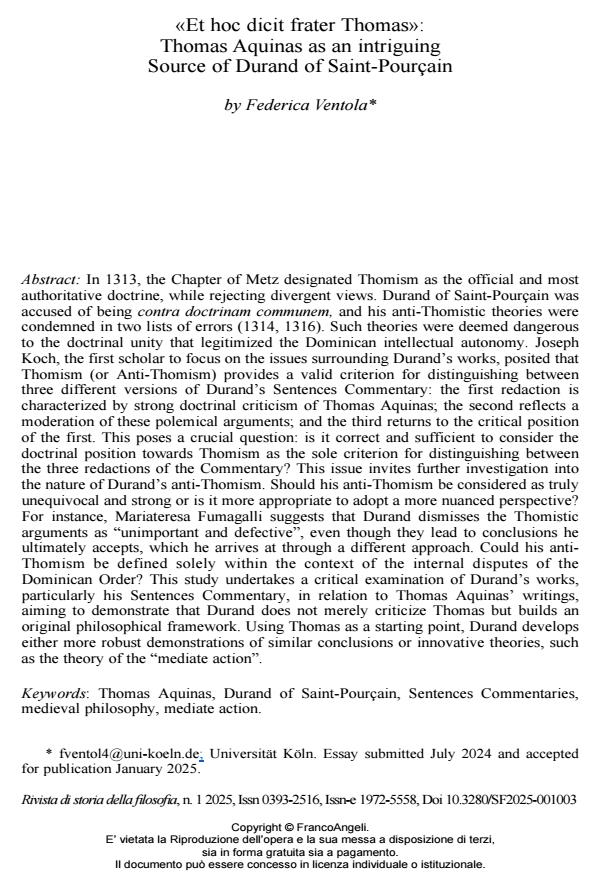«Et hoc dicit frater Thomas»: Thomas Aquinas as an intriguing Source of Durand of Saint-Pourçain
Journal title RIVISTA DI STORIA DELLA FILOSOFIA
Author/s Federica Ventola
Publishing Year 2025 Issue 2025/1
Language English Pages 23 P. 21-43 File size 186 KB
DOI 10.3280/SF2025-001003
DOI is like a bar code for intellectual property: to have more infomation
click here
Below, you can see the article first page
If you want to buy this article in PDF format, you can do it, following the instructions to buy download credits

FrancoAngeli is member of Publishers International Linking Association, Inc (PILA), a not-for-profit association which run the CrossRef service enabling links to and from online scholarly content.
In 1313, the Chapter of Metz designated Thomism as the official and most authoritative doctrine, while rejecting divergent views. Durand of Saint-Pourçain was accused of being contra doctrinam communem, and his anti-Thomistic theories were condemned in two lists of errors (1314, 1316). Such theories were deemed dangerous to the doctrinal unity that legitimized the Dominican intellectual autonomy. Joseph Koch, the first scholar to focus on the issues surrounding Durand’s works, posited that Thomism (or Anti-Thomism) provides a valid criterion for distinguishing between three different versions of Durand’s Sentences Commentary: the first redaction is characterized by strong doctrinal criticism of Thomas Aquinas;; the second reflects a moderation of these polemical arguments;; and the third returns to the critical position of the first. This poses a crucial question: is it correct and sufficient to consider the doctrinal position towards Thomism as the sole criterion for distinguishing between the three redactions of the Commentary? This issue invites further investigation into the nature of Durand’s anti-Thomism. Should his anti-Thomism be considered as truly unequivocal and strong or is it more appropriate to adopt a more nuanced perspective? For instance, Mariateresa Fumagalli suggests that Durand dismisses the Thomistic arguments as “unimportant and defective”, even though they lead to conclusions he ultimately accepts, which he arrives at through a different approach. Could his antiThomism be defined solely within the context of the internal disputes of the Dominican Order? This study undertakes a critical examination of Durand’s works, particularly his Sentences Commentary, in relation to Thomas Aquinas’ writings, aiming to demonstrate that Durand does not merely criticize Thomas but builds an original philosophical framework. Using Thomas as a starting point, Durand develops either more robust demonstrations of similar conclusions or innovative theories, such as the theory of the “mediate action”.
Keywords: Thomas Aquinas, Durand of Saint-Pourçain, Sentences Commentaries, medieval philosophy, mediate action.
Federica Ventola, «Et hoc dicit frater Thomas»: Thomas Aquinas as an intriguing Source of Durand of Saint-Pourçain in "RIVISTA DI STORIA DELLA FILOSOFIA" 1/2025, pp 21-43, DOI: 10.3280/SF2025-001003